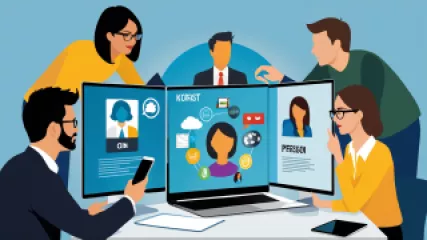The Surprising Psychology Behind Effective Online Cooperation
The Surprising Psychology Behind Effective Online Cooperation
In today's digital age, where remote work and virtual collaboration have become the norm, the importance of effective online cooperation cannot be overstated. As we navigate this new landscape, understanding the psychological factors that drive successful online cooperation is crucial. In this insightful opinion piece, Genevieve Gibson delves into the fascinating world of the psychology behind effective online cooperation, shedding light on the often-overlooked aspects that can make or break our virtual interactions.
The Cooperation Mindset: Cultivating a Shared Sense of Purpose
At the heart of effective online cooperation lies a fundamental shift in mindset. Rather than approaching virtual interactions as a series of individual tasks to be completed, we must cultivate a shared sense of purpose and a genuine desire to work together towards a common goal. This cooperation mindset is not just a lofty ideal – it is a critical component of success in the digital realm.
When individuals embrace this mindset, they are more likely to engage in active listening, empathize with their peers, and actively contribute to the collective effort. This, in turn, fosters a culture of mutual understanding, trust, and a willingness to overcome challenges collaboratively. As Genevieve explains, "The cooperation mindset is not just about dividing up responsibilities – it's about aligning our individual motivations with the greater good of the team."
Emotional Intelligence: The Key to Navigating Virtual Interactions
In the absence of physical proximity, emotional intelligence becomes a vital skill for successful online cooperation. Genevieve emphasizes the importance of developing emotional awareness, both in terms of understanding our own emotions and being attuned to the emotional states of our virtual team members.
By cultivating emotional intelligence, individuals can navigate the nuances of online communication more effectively, picking up on subtle cues, addressing concerns proactively, and fostering a sense of connection even in the absence of face-to-face interaction. As Genevieve notes, "Emotional intelligence is the glue that holds virtual teams together, allowing us to build trust, resolve conflicts, and maintain a positive, collaborative environment."
Overcoming the Challenges of Online Cooperation
While the benefits of effective online cooperation are numerous, the challenges inherent in virtual interactions cannot be ignored. Genevieve acknowledges the unique obstacles that can arise, such as the sense of isolation, the potential for miscommunication, and the difficulty in maintaining engagement and accountability.
However, she argues that these challenges can be overcome through a combination of strategic planning, clear communication, and a commitment to continuous improvement. By implementing robust communication protocols, leveraging technology to facilitate virtual face-to-face interactions, and fostering a culture of feedback and adaptation, teams can navigate the complexities of online cooperation and unlock its full potential.
The Role of Coaching and Emotional Wellness
Genevieve's analysis extends beyond the practical aspects of online cooperation, delving into the importance of emotional wellness and the role of coaching in enhancing these critical skills. She emphasizes that effective online cooperation is not just about task completion – it is about nurturing the psychological and emotional well-being of team members.
By incorporating coaching and emotional wellness practices into the online collaboration process, individuals can develop the self-awareness, resilience, and interpersonal skills necessary to thrive in virtual environments. As Genevieve eloquently states, "Cooperation is not just a skill – it's a mindset, a way of being. And by investing in our emotional wellness, we empower ourselves and our teams to navigate the challenges of online collaboration with greater ease and success."
Embracing the Future of Cooperation
In conclusion, Genevieve's insights on the psychology of effective online cooperation offer a compelling roadmap for navigating the digital landscape. By cultivating a cooperation mindset, honing emotional intelligence, and embracing the role of coaching and emotional wellness, individuals and teams can unlock the full potential of virtual collaboration and position themselves for success in the ever-evolving world of remote work and digital interaction.
As Genevieve reminds us, "The future of work is here, and it is defined by our ability to cooperate effectively in online spaces. By understanding the psychological factors that drive successful virtual collaboration, we can not only adapt to this new reality but also shape it in ways that bring out the best in ourselves and our teams."
Keywords used naturally throughout the article:
- cooperation mindset coaching
- cooperation and emotional wellness
- enhancing cooperation abilities
- cooperation therapy online
- cooperation for emotional support






